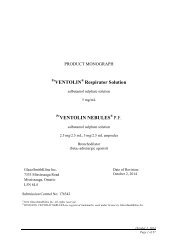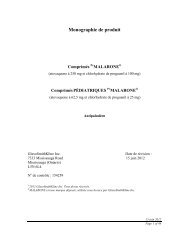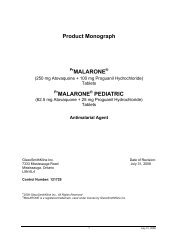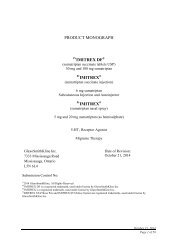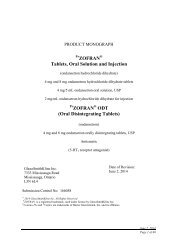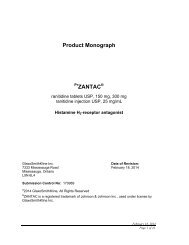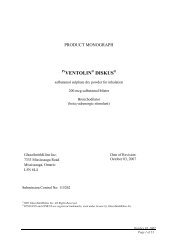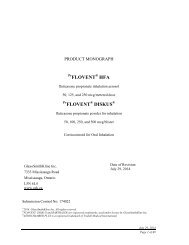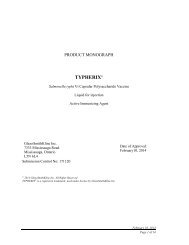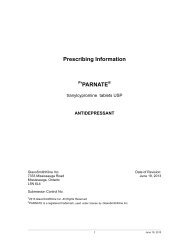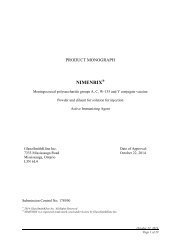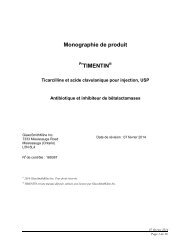ADVAIR DISKUS ADVAIR - GlaxoSmithKline
ADVAIR DISKUS ADVAIR - GlaxoSmithKline
ADVAIR DISKUS ADVAIR - GlaxoSmithKline
You also want an ePaper? Increase the reach of your titles
YUMPU automatically turns print PDFs into web optimized ePapers that Google loves.
Endocrine And Metabolism<br />
Systemic Steroid Replacement by Inhaled Steroid<br />
Particular care is needed in patients who are transferred from systemically active<br />
corticosteroids to inhaled corticosteroids because deaths due to adrenal insufficiency have<br />
occurred in patients with asthma during and after transfer. For the transfer of patients<br />
being treated with oral corticosteroids, inhaled corticosteroids should first be added to the<br />
existing oral steroid therapy which is then gradually withdrawn.<br />
Patients with adrenocortical suppression should be monitored regularly and the oral<br />
steroid reduced cautiously. Some patients transferred from other inhaled steroids or oral<br />
steroids remain at risk of impaired adrenal reserve for a considerable time after<br />
transferring to inhaled fluticasone propionate.<br />
After withdrawal from systemic corticosteroids, a number of months are required for<br />
recovery of hypothalamic-pituitary-adrenal (HPA) function. During this period of HPA<br />
suppression, patients may exhibit signs and symptoms of adrenal insufficiency when<br />
exposed to trauma, surgery or infections, particularly gastroenteritis. Although inhaled<br />
fluticasone propionate may provide control of asthmatic symptoms during these episodes,<br />
it does not provide the systemic steroid which is necessary for coping with these<br />
emergencies. The physician may consider supplying oral steroids for use in times of<br />
stress (e.g. worsening asthma attacks, chest infections, and surgery).<br />
During periods of stress or a severe asthmatic attack, patients who have been withdrawn<br />
from systemic corticosteroids should be instructed to resume systemic steroids<br />
immediately and to contact their physician for further instruction. These patients should<br />
also be instructed to carry a warning card indicating that they may need supplementary<br />
systemic steroids during periods of stress or a severe asthma attack. To assess the risk of<br />
adrenal insufficiency in emergency situations, routine tests of adrenal cortical function,<br />
including measurement of early morning and evening cortisol levels, should be<br />
performed periodically in all patients. An early morning resting cortisol level may be<br />
accepted as normal only if it falls at or near the normal mean level.<br />
Systemic Effects<br />
Systemic effects may occur with any inhaled corticosteroid, particularly at high doses<br />
prescribed for long periods; these effects are much less likely to occur than with oral<br />
corticosteroids. Possible systemic effects include Cushing’s syndrome, Cushingoid<br />
features, and adrenal suppression, growth retardation in children and adolescents,<br />
decrease in bone mineral density (BMD), cataract and glaucoma. It is important<br />
therefore, that the dose of inhaled corticosteroid is titrated to the lowest dose at which<br />
effective control is maintained (see Monitoring and Laboratory Tests).<br />
Effects on Growth<br />
A reduction of growth velocity in children or teenagers may occur as a result of<br />
inadequate control of chronic diseases such as asthma or from use of corticosteroids for<br />
treatment. Physicians should closely follow the growth of children and adolescents<br />
July 29, 2014<br />
Page 7 of 67



